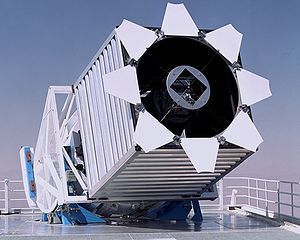"대문"의 두 판 사이의 차이
잔글 (‘대문’ 문서의 보호 설정을 변경함 [edit=sysop:move=sysop]) |
|||
| (사용자 3명의 중간 판 38개는 보이지 않습니다) | |||
| 1번째 줄: | 1번째 줄: | ||
| − | <big>About KSG</big> | + | == <big>About KSG</big> == |
The Korean Scientist Group (KSG) comes to a new partner of the Sloan Digital Sky Survey (SDSS) in | The Korean Scientist Group (KSG) comes to a new partner of the Sloan Digital Sky Survey (SDSS) in | ||
| 9번째 줄: | 9번째 줄: | ||
collaboration of members on SDSS project. | collaboration of members on SDSS project. | ||
| − | + | [[Image:Ksglogo.gif|thumb|KSG logo]]About KSG logo represents the principles of heaven (point), earth (horizontal line), and man (vertical line), originated from the basic design of vowels of Korean native alphabet, "Hangul". Hangul system was completed in 1443 and published in 1446 in a document entitled Hunmin Jeong-eum. A horizontal bar represents the flat Earth, a bulding above the bar is Cheomseongdae which is an astronomical observatory built circa 647 in Sila which stands for human's endeavors seeking to know universe, and a circla represents sky or universe. The pattern of the circle also represents concept of yin and yang. | |
| − | |||
| − | |||
| + | == <big>About SDSS</big> == | ||
| + | The Sloan Digital Sky Survey (http://www.sdss.org), when completed, will map in detail one-quarter of the entire sky, determining the positions and absolute brightness of 100 million celestial objects. It will also measure the distances to more than a million galaxies and quasars. | ||
| + | [http://sdss.org/ Mapping the Universe!] | ||
| + | [http://www.sdss.org/news/index.html SDSS Press Releases] | ||
| + | [http://www.sdss.org/status/index.html Survey Status] | ||
| + | [http://www.sdss.org/science/index.html Data Products] | ||
| + | [http://cas.sdss.org/ SDSS SkyServer] | ||
| + | [http://www.sdss.org/science/DRschedule.html Data Release Schedule] -- timeline for public release of SDSS data products. | ||
| + | [http://sdss.org/dr4/products/value_added/index.html Value-added catalogs derived from SDSS data] | ||
| + | June, 2005: Data Release Four: 180 milion unique objects Imaging & 849,920 spectra. | ||
| + | June, 2006: Data Release Five: 215 milion unique objects Imaging & 1,048,960 spectra. | ||
| + | [http://www.sdss.org/publications/index.html Publications] | ||
| + | [[Image:apo2.5m.jpg|thumb| | ||
| + | The 2.5-meter Sloan telescope at New Mexico, USA. Photo courtesy of SDSS]] | ||
| + | * Funding for the SDSS and SDSS-II has been provided by the Alfred P. Sloan Foundation, the Participating Institutions, the National Science Foundation, the U.S. Department of Energy, the National Aeronautics and Space Administration, the Japanese Monbukagakusho, the Max Planck Society, and the Higher Education Funding Council for England. The SDSS Web Site is http://www.sdss.org/. | ||
| − | ---- | + | * The SDSS is managed by the Astrophysical Research Consortium for the Participating Institutions. The Participating Institutions are the American Museum of Natural History, Astrophysical Institute Potsdam, University of Basel, Cambridge University, Case Western Reserve University, University of Chicago, Drexel University, Fermilab, the Institute for Advanced Study, the Japan Participation Group, Johns Hopkins University, the Joint Institute for Nuclear Astrophysics, the Kavli Institute for Particle Astrophysics and Cosmology, the Korean Scientist Group, the Chinese Academy of Sciences (LAMOST), Los Alamos National Laboratory, the Max-Planck-Institute for Astronomy (MPIA), the Max-Planck-Institute for Astrophysics (MPA), New Mexico State University, Ohio State University, University of Pittsburgh, University of Portsmouth, Princeton University, the United States Naval Observatory, and the University of Washington. |
| − | + | ||
| + | * Related SDSS Collaboration Links | ||
| + | [http://sdss.org/members/index.html Participating Institutions] | ||
| + | [http://sdss.org/members/others.html External Participants] | ||
| + | [http://www.astro.psu.edu/users/dps/sdsspubguide.html SDSS Publication Procedures] | ||
| + | [http://www.sdss.org/collaboration/key_projects.html Key Projects List] | ||
| + | [http://sdss.org/members/builders.html Builders List] | ||
| + | [http://sdss.org/policies/index.html Collaboration Policies] | ||
| + | [http://sdss.org/policies/pub_policy.html Publication Policies] | ||
| − | '''위키 사용법''' | + | == '''위키 사용법''' == |
#페이지를 수정, 새롭게 생성하거나 자료를 업로드하기: 개인 계정을 만들고 [mailto:yy.choi@khu.ac.kr 관리자]의 인증이 필요합니다. | #페이지를 수정, 새롭게 생성하거나 자료를 업로드하기: 개인 계정을 만들고 [mailto:yy.choi@khu.ac.kr 관리자]의 인증이 필요합니다. | ||
2013년 4월 23일 (화) 08:17 기준 최신판
About KSG
The Korean Scientist Group (KSG) comes to a new partner of the Sloan Digital Sky Survey (SDSS) in July of 2004. The KSG is a consortium of academic institutions organized in 2004. Current KSG members are Korea Institute for Advanced Study (KIAS), Kyungpook National University, Kyung Hee Univeristy, Pusan National University, Sejong University, Seoul National University, and Yonsei University. The KSG consists of 10 professors, post-docs and graduate students, and hosts KSG meeting twice per year to discuss related issues, to share their common interests and information, and to promote close collaboration of members on SDSS project.
About KSG logo represents the principles of heaven (point), earth (horizontal line), and man (vertical line), originated from the basic design of vowels of Korean native alphabet, "Hangul". Hangul system was completed in 1443 and published in 1446 in a document entitled Hunmin Jeong-eum. A horizontal bar represents the flat Earth, a bulding above the bar is Cheomseongdae which is an astronomical observatory built circa 647 in Sila which stands for human's endeavors seeking to know universe, and a circla represents sky or universe. The pattern of the circle also represents concept of yin and yang.
About SDSS
The Sloan Digital Sky Survey (http://www.sdss.org), when completed, will map in detail one-quarter of the entire sky, determining the positions and absolute brightness of 100 million celestial objects. It will also measure the distances to more than a million galaxies and quasars.
Mapping the Universe! SDSS Press Releases Survey Status Data Products SDSS SkyServer Data Release Schedule -- timeline for public release of SDSS data products. Value-added catalogs derived from SDSS data June, 2005: Data Release Four: 180 milion unique objects Imaging & 849,920 spectra. June, 2006: Data Release Five: 215 milion unique objects Imaging & 1,048,960 spectra. Publications
- Funding for the SDSS and SDSS-II has been provided by the Alfred P. Sloan Foundation, the Participating Institutions, the National Science Foundation, the U.S. Department of Energy, the National Aeronautics and Space Administration, the Japanese Monbukagakusho, the Max Planck Society, and the Higher Education Funding Council for England. The SDSS Web Site is http://www.sdss.org/.
- The SDSS is managed by the Astrophysical Research Consortium for the Participating Institutions. The Participating Institutions are the American Museum of Natural History, Astrophysical Institute Potsdam, University of Basel, Cambridge University, Case Western Reserve University, University of Chicago, Drexel University, Fermilab, the Institute for Advanced Study, the Japan Participation Group, Johns Hopkins University, the Joint Institute for Nuclear Astrophysics, the Kavli Institute for Particle Astrophysics and Cosmology, the Korean Scientist Group, the Chinese Academy of Sciences (LAMOST), Los Alamos National Laboratory, the Max-Planck-Institute for Astronomy (MPIA), the Max-Planck-Institute for Astrophysics (MPA), New Mexico State University, Ohio State University, University of Pittsburgh, University of Portsmouth, Princeton University, the United States Naval Observatory, and the University of Washington.
- Related SDSS Collaboration Links
Participating Institutions External Participants SDSS Publication Procedures Key Projects List Builders List Collaboration Policies Publication Policies
위키 사용법
- 페이지를 수정, 새롭게 생성하거나 자료를 업로드하기: 개인 계정을 만들고 관리자의 인증이 필요합니다.
- 글쓰기는 도움글을 참조하세요: Help:Editing

